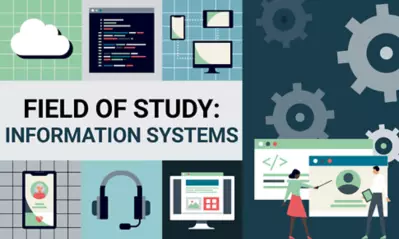Articles > Information Technology > What is information security?
What is information security?

Written by Kellye Fox

Reviewed by Kathryn Uhles, MIS, MSP, Dean, College of Business and IT

Businesses and organizations that rely on digital data and live under the threat of data breaches, need information security to ensure confidentiality, integrity and availability of their digital assets. Let’s look at this area of IT.
Introduction to information security
What is information security exactly? Sometimes known as “infosec,” it falls under the broader information technology (IT) field and focuses on protecting data, checking for vulnerabilities in network systems, blocking unauthorized access. Professionals in this field oversee computer networks and promptly investigate data breaches. They use protective software, like firewalls and data encryption programs, to guard sensitive information. They also stay updated on IT security trends and advise on security protocols and enhancements.
Challenges and opportunities of information security
As data breaches and cyber threats increase, infosec professionals are challenged to develop more sophisticated techniques to thwart malicious or negligent acts. Technologies like artificial intelligence also introduce new security challenges, including difficulty detecting ransomware and phishing schemes.
As a result, there’s growing demand in this field for skilled professionals across various industries. like risk management, incident response, encryption and cryptography, for example. Protecting digital assets, in other words, can take many forms, so embracing a continuous learning mindset can position professionals to thrive in this ever-changing field.
Information security vs. cybersecurity
While some people use the terms interchangeably, information security and cybersecurity are separate fields and have different functions. (The National Institute of Standards and Technology classifies these areas as different fields and lists them separately in its glossary of terms.)
Cybersecurity is actually a subset of the infosed field that focuses on the protection of digital systems and cyber threats, like malware, phishing, ransomware, spyware and hacking.
Information security, meanwhile, encompasses physical, digital and intellectual formats.
The two fields occasionally overlap when it comes to managing digital files. Infosec and cybersecurity also share some of the same minimum education requirements, career paths and necessary tech skills.
Job outlook and salary potential
As of May 2024, information security analysts earned between $69,660 and $186,420, with a median wage of $124,910, according to the U.S. Bureau of Labor Statistics (BLS). Some of the highest-paying industries for these analysts are information, finance and insurance, and computer systems design.
Employment of information security analysts is projected to grow 33 percent from 2023 to 2033, much faster than the average for all occupations. About 17,300 openings for information security analysts are projected each year, on average, over the decade.
This faster-than-average employment increase is partially due to businesses’ need for experts who can manage and solve problems like fraud prevention and data risks, according to BLS.
Salary ranges and BLS Occupational Employment Projections are not specific to students or graduates of University of Phoenix. Actual outcomes vary based on multiple factors, including prior work experience, geographic location and other factors specific to the individual. University of Phoenix does not guarantee employment, salary level or career advancement. BLS data is geographically based. Information for a specific state/city can be researched on the BLS website.
BLS Occupational Employment Projections, 2023-2033 is published by the U.S. Bureau of Labor Statistics. This data reflects BLS’ projections of national (not local) conditions. These data points are not specific to University of Phoenix students or graduates.
Skills and certifications
Prospective students can enhance their employability by gaining in-demand skills and obtaining certifications. While not required, employers prefer candidates with a certification, according to BLS.
Earning those certifications (with such organizations as EC-Council and CompTIA) can be its own process.
BLS outlines other important qualities that information security professionals should have, such as:
- Analytical abilities: On a basic level, information security analysts need to know how to examine computer systems and networks, evaluate vulnerabilities, and identify ways to improve security protocols and policies.
- Effective communication: Being able to convey information to both technical and non-technical audiences is crucial when potential threats need to be resolved quickly and with confidentiality.
- Innovative aptitude: Another key responsibility for infosec is anticipating potential security risks and devising new methods to protect computer systems and networks.
- Attention to detail: There’s a wealth of information to pay attention to when there are cyberattacks, so security analysts in this field must meticulously observe even minor performance fluctuations.
- Problem-solving expertise: Working under pressure is especially needed when it’s time to uncover and promptly address security alerts.
Education for careers in information security
According to BLS, many information security positions require a bachelor’s degree in computer and information technology or a related field.
While there isn’t a specific information security program available, University of Phoenix offers many flexible online programs, including a cybersecurity program online, an Information Technology competency degree, and a master’s in cybersecurity online..
Contact University of Phoenix for more information.

ABOUT THE AUTHOR
Kellye is a versatile writer with more than 10 years of print and digital experience. She’s passionate about explaining complex topics, educating readers and sharing useful tips. When Kellye’s not attached to her computer, she enjoys cooking, gardening, reading and watching movies with her husband and two children.

ABOUT THE REVIEWER
Currently Dean of the College of Business and Information Technology, Kathryn Uhles has served University of Phoenix in a variety of roles since 2006. Prior to joining University of Phoenix, Kathryn taught fifth grade to underprivileged youth in Phoenix.
This article has been vetted by University of Phoenix's editorial advisory committee.
Read more about our editorial process.


Get your free IT Program Guide
Learn how 100% of our IT degree and certificate programs align with career-relevant skills.
Thank you
Download your pdf guide now. Or access the link in our email.


